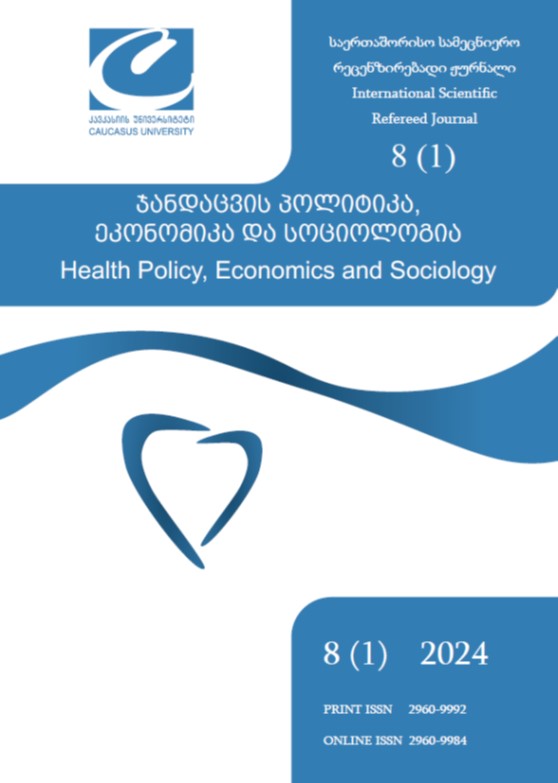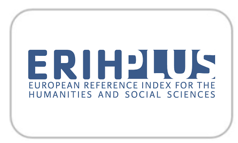Impact of The Rearing Style on Self-Esteem and its Role in Mental Health
DOI:
https://doi.org/10.52340/healthecosoc.2024.08.01.10Keywords:
child-rearing styles, adaptation, self-esteem, Public healthAbstract
Introduction: Public health is a multi-component construct, one of the constituent components of which is the mental and psychological aspect, and plays a significant role in maintaining the integrity of health. Today it is more relevant to study these psychological aspects, such as self-esteem, psychological well-being, level of adaptation, resilience, and the study of their impact on the healthy functioning of an individual. It is also important to study the formation of these psychological factors and the variables affecting them. The present work was aimed at studying the role of self-esteem and its influence on the level of adaptation, along with other psychological components, and researching the influence of parenting style on the formation of self-esteem. Methodology: As part of the qualitative research, 6 female and 3 male persons were interviewed. Results: An adequate (upper limit of the average estimate) self-esteem has a positive effect on the level of adaptation because the subjects with this type of assessment have maintained a realistic attitude and healthy criticism towards themselves. The authoritative parenting style contributes to the formation of adequate self-esteem, while the authoritarian parenting style has a negative impact on the formation of self-esteem. Conclusion: It is necessary to raise the level of awareness of the population regarding parenting style, and the management of this problem and the development of targeted programs should be the responsibility of schools and relevant State structures.
References
Barrowclough C, Tarrier N, Humphreys L, Ward J, Gregg L, Andrews B. (2003). Self-esteem in schizophrenia: relationships between self-evaluation, family attitudes, and symptomatology. J Abnorm Psychol. 112(1):92-9.
Butler, R., & Bauld, L. (2005). The parents’ experience: coping with drug use in the family. Drugs: Education, Prevention and Policy, 12(1), 35–45. https://doi.org/10.1080/0968763042000275308.
Baumeister RF, Campbell JD, Krueger JI, Vohs KD. Does High Self-Esteem Cause Better Performance, Interpersonal Success, Happiness, or Healthier Lifestyles? Psychol Sci Public Interest. 2003 May;4(1):1-44.
Britto PR, Lye SJ, Proulx K, Yousafzai AK, Matthews SG, Vaivada T, Perez-Escamilla R, Rao N, Ip P, Fernald LCH, MacMillan H, Hanson M, Wachs TD, Yao H, Yoshikawa H, Cerezo A, Leckman JF, Bhutta ZA; Early Childhood Development Interventions Review Group, for the Lancet Early Childhood Development Series Steering Committee. Nurturing care: promoting early childhood development. Lancet. 2017 Jan 7;389(10064):91-102. doi: 10.1016/S0140-6736(16)31390-3.
Damon M, Cole DH, Ostrom E, Sterner T. (2019), Grandfathering: Environmental Uses and Impacts. Review of Environmental Economics and Policy 13(1).
Darling & Steinberg, (2017), Parenting Style as Context: An Integrative Model In Book: Interpersonal Development (pp.161-170)
DeLongis, A., Folkman, S., & Lazarus, R. S. (1988). The impact of daily stress on health and mood: Psychological and social resources as mediators. Journal of Personality and Social Psychology, 54(3), 486–495.
Eccles & Harold (1993), Parent-school involvement during the early adolescent years. Journal ArticleDatabase: APA PsycInfo. Teachers College Record, 94(3), 568–587.
Evans et al.,( 2020), Characterising the evidence base for advanced clinical practice in the UK: a scoping review protocol 0(5):e036192. Pub. Med.
Ge, X., Conger, R. D., Cadoret, R. J., Neiderhiser, J. M., Yates, W., Troughton, E., & Stewart, M. A. (1996). The developmental interface between nature and nurture: A mutual influence model of child antisocial behavior and parent behaviors. Developmental Psychology, 32(4), 574–589. https://doi.org/10.1037/0012-1649.32.4.574
Hines & Holcomb-McCoy. (2013). Parental Characteristics, Ecological Factors, and the Academic Achievement of African American Males. Journal of counseling and development, 91(1).
Henning ER, Turk CL, Mennin DS, Fresco DM, Heimberg RG. (2007). Impairment and quality of life in individuals with generalized anxiety disorder. Depress Anxiety. 24(5):342-9.
Kohlberg, L. (1964) Development of Moral Character and Moral Ideology. In: Hofmann, M.L., Hofmann, L.W., Eds., Review of Child Development Research. Russell Sage Foundation, New York.
Kossek & Ozeki (1998). Work-Family Conflict, Policies, and The Job-Life Satisfaction Relationship: A Review and Directions for Organizational Behavior-Human Resources Research Journal of Applied Psychology 83(2):139-149
Kuczynski, L. (2003). Beyond Bidirectionality: Bilateral Conceptual Frameworks for Understanding Dynamics in Parent-Child Relations. In L. Kuczynski (Ed.), Handbook of Dynamics in Parent-Child Relations (pp. 3-24). Thousand Oaks, CA: SAGE Publishing.
Lauer L, Gould D, Roman N, Pierce M. (2010), Parental behaviors that affect junior tennis player development. Psychology of Sport and Exercise 11(6):487-496
Orth U, Robins RW, Trzesniewski KH, Maes J, Schmitt M. (2009). Low self-esteem is a risk factor for depressive symptoms from young adulthood to old age. J Abnorm Psychol. 118(3):472-8.
Rohner, R. P., & Britner, P. A. (2002). Worldwide mental health correlates of parental acceptance–rejection: Review of cross-cultural and intracultural evidence. Cross-Cultural Research: The Journal of Comparative Social Science, 36(1), 15–47.
Rohner, RP, Britner PA. (2005), Parental Acceptance-Rejection Theory, Methods, and Implications. Volume 36, Issue 1 In book: Handbook for the Study of Parental Acceptance and Rejection.1-35.
Turiel, E. (2008). Thought about actions in social domains: Morality, social conventions, and social interactions. Cognitive Development, 23(1), 136–154.
Sanvictores T, Mendez MD. (2022). Types of Parenting Styles and Effects On Children. In: StatPearls [Internet]. Treasure Island (FL): StatPearls Publishing; 2024
Spera C. (2005), A Review of the Relationship among Parenting Practices, Parenting Styles, and Adolescent School Achievement. Educational Psychology Review, 17, 125-146.
Van IJzendoorn & Juffer, (2006 ), Adoption as intervention. Meta-analytic evidence for massive catch-up and plasticity in physical, socio-emotional, and cognitive development. The Journal od Child Psychology and Psichiatry. 47(12):1228-45. doi: 10.1111/j.1469-7610.2006.01675.x.
Wenar C, Kerig P (2000), Developmental psychopathology: From infancy through adolescence (4th ed.). McGraw-Hill.
Wood et al., (2003), Parenting and childhood anxiety: Theory, empirical findings, and future directions Source: PubMed.
Zaki, J, Williams WC. (2013). Interpersonal Emotion Regulation, Emotion 13(5):803-810.
Zeigler-Hill, V., Abraham, J. (2006). Borderline personality features: Instability of Self-Esteem and Affect. Journal of Social and Clinical Psychology, 25(6), 668–687.
V. Zeigler-Hill ( 2010). The Connections Between Self-Esteem and Psychopathology. Journal of Contemporary Psychotherapy.














